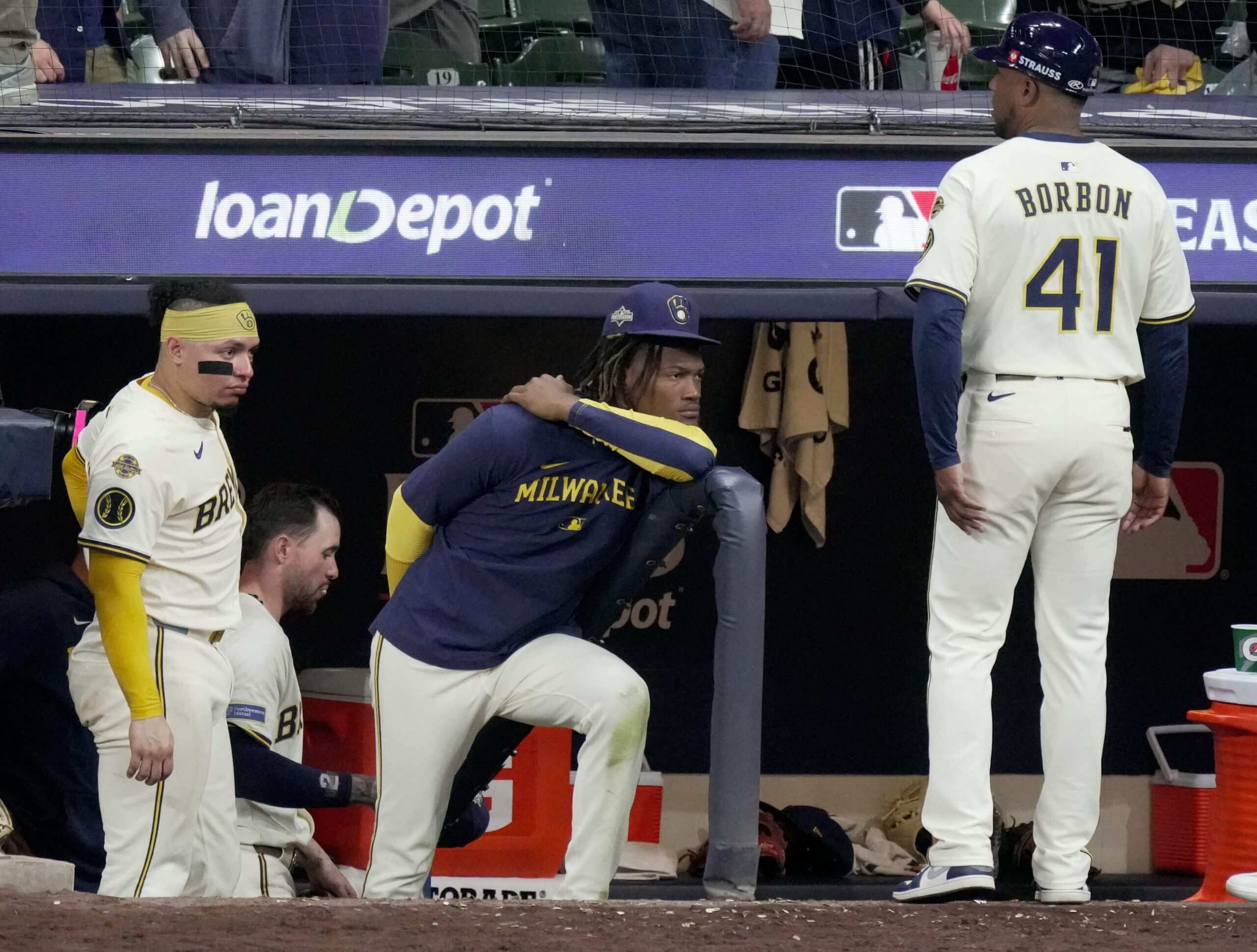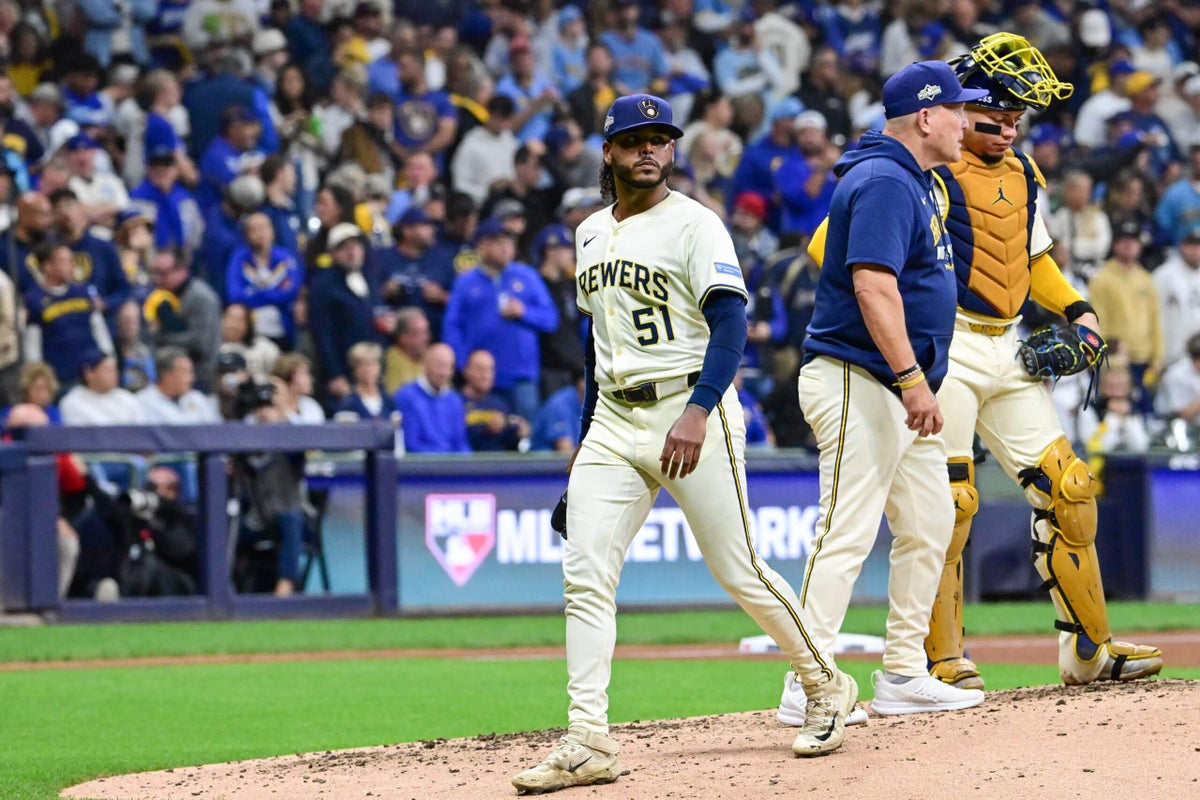MILWAUKEE — Sunday evening, before Milwaukee Brewers manager Pat Murphy endured two failed attempts to best the Los Angeles Dodgers, he walked along a ground-floor hallway to exit American Family Field. A Brewers clubhouse attendant zipped by in a golf cart ferrying Dodgers star Mookie Betts. The anecdote fit into the story Murphy tried to sell leading into the National League Championship Series. The world champion Dodgers employed stars. Even in their own home, in Murphy’s telling, the 97-win Brewers were only bystanders.
“Passed me right by like I wasn’t even there,” Murphy cracked. “I’m, like, ‘Hey, 10 years, I’ve never gotten a ride.’ (And there) was Mookie in front, smiling.”
Murphy was smiling, too. He was enthused and he was hopeful about his club’s chances. He was willing to rave about the exploits and abilities of his opponent, and to draw the contrast with his own group of unheralded but effective players. That was Sunday. By Tuesday night, in the minutes after a 5-1 loss in Game 2, Murphy had changed tack. He shifted to trying to pump up his own team.
“The one thing is, you guys may have counted us out,” Murphy said. “And I understand that — 90 percent of the teams that have been in this situation don’t win the series. But this team has been counted out a lot this year. And I think there’s some fight left in them.”
His math was a little fuzzy — teams that are down 2-0 in a seven-game series have won about 16 percent of the time — but his message was reasonable. To bring baseball back to Milwaukee in 2025, the Brewers will need to win at least two of three games at Dodger Stadium, where the series will resume Thursday.

William Contreras, left, and pitcher Abner Uribe stand in the dugout after the final out of NLCS Game 2. (Milwaukee Journal Sentinel via Imagn Images)
The team will have to hope its beleaguered bullpen can hold the line behind a patchwork rotation. The team will have to hope its hitters can recapture the verve and confidence that buoyed it throughout the summer. And the Brewers will have to hope the Dodgers’ starters Tyler Glasnow and Shohei Ohtani are less suffocating than the two-man wrecking crew of Blake Snell and Yoshinobu Yamamoto. “These pitchers,” Murphy said, “brought out the worst in us.”
As Game 2 spiraled out of control, the ballpark emptied. The exodus began after Yamamoto buzzed through a scoreless eighth inning. A procession of blue-and-yellow-clad fans decided to beat the traffic on Interstate 94. This season featured so much joy at this ballpark. The team won more games than any other in franchise history. The group conquered its opening-round demons in defeating the Chicago Cubs last week. The future still looks bright. But the present looks bleak.
“We’ve just got to play better,” Brewers cornerstone Christian Yelich said. “It’s not an ideal start to the series, by any means.”
The payroll disparity between these two clubs is profound. Yelich is the only Brewer on the NLCS roster with an eight-figure salary. The Dodgers have nine players on their roster earning that type of money. Yamamoto is in the second season of the richest free-agent contract ever for a pitcher, a 12-year, $325 million deal. After winning the World Series, the Dodgers made a five-year, $182 million pact with Snell, the centerpiece of another spending spree.
The Brewers do not compete in those financial markets. But the team demonstrated this summer that it could compete with the Dodgers. Milwaukee won all six games the two teams played this season. Those games took place in July, sandwiched around the All-Star Game. Snell was on the injured list. So was third baseman Max Muncy, who ended Brewers No. 1 starter Freddy Peralta’s evening with a solo shot in the sixth inning. The script has flipped now.
“We’re more depleted than the Dodgers are,” Murphy said. “But none of that matters.”
What is galling for the Brewers is that some things went right for the club during these 18 innings. The pitching staff limited the Dodgers to seven runs. The lineup bullied Dodgers closer Roki Sasaki. The crowd was vocal whenever given reason.
Thanks to Snell and Yamamoto, there was little reason to cheer. Tuesday, the hitters produced more offense on Yamamoto’s first pitch than they had on the 103 thrown by Snell in Game 1. Brewers outfielder Jackson Chourio supplied a leadoff homer. But the blast acted only as a mirage.
After Chourio went deep, the Brewers kept trying to jump Yamamoto. They ended up ambushing themselves. Yamamoto needed only 24 pitches to turn over the Milwaukee lineup. The Brewers swung at the first pitch in six of their first nine at-bats. The hitters did not work a walk until No. 9 hitter Joey Ortiz took one in the fifth inning. Ortiz was the last Brewer to reach base in Yamamoto’s complete game.
“We chased way more than we’ve chased all year,” Murphy said, adding, “Sometimes great pitching brings out the worst in you.”
The worst in the Brewers’ hitters was no match for the best from the Dodgers’ starters. The day off Wednesday will only provide so much time to reset. While the Dodgers will line up Glasnow and Ohtani, the Brewers will once again turn to their relief corps. Either veteran Jose Quintana or rookie Jacob Misiorowski could handle a bulk assignment in Game 3.
Murphy emptied his bullpen during these two fruitless evenings at home. All four of his high-leverage arms — closer Abner Uribe, right-hander Trevor Megill and the left-handed duo of Aaron Ashby and Jared Koenig — appeared in Game 1. A day later, Uribe was the first man out of the bullpen, with Ashby behind him. Uribe has now pitched three times in the past four days, clouding his availability for the three consecutive games in Los Angeles.
Then again, the Brewers need to win one of the next two games to even push this series to a Game 5. “We’ve fought all year,” second baseman Brice Turang said. “Heading to L.A., we know what we’ve got to do.”
Murphy referenced the team’s sweep in Los Angeles. July, of course, was a long time ago. And the optimism felt Sunday, before these 18 innings of torture against Snell and Yamamoto, felt like a distant memory, too.

